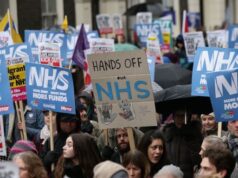Issue: 67
21 May 2018
This occasional newsletter is researched, written and edited by a group of concerned residents in Ealing, West London who want to preserve our NHS. We view the wholesale engagement of private, for-profit healthcare service suppliers as unnecessary, profligate and dangerous. Increased financial funding is what is needed in our NHS – not financial cuts, closure of vital services or privatisation.
This Newsletter is Now Five Years’ Old!
In May 2013 we produced the first ‘Our NHS in Crisis’ newsletter. We announced that in March 2013 the Secretary of State had agreed to refer the decision to close 4 of the 9 A&E departments in NHS NW London. He then referred the matter to the Independent Reconfiguration Panel IRP). The IRP has come and gone but only 2 A&Es were closed – with disastrous results.
We also announced a 50% shortfall in trainee doctors and consultants. No wonder NHS Trusts have 100s of unfilled vacancies
Is there a Crisis in Primary Care Commissioning in Ealing?
Three meetings in public were scheduled for the Ealing Clinical Commissioning Group (ECCG) Primary Care Commissioning Committee (PCCC) in March, April and May 2018. Only one of them took place. The last one – on 9 May 2018 – was cancelled at very short notice.
At the 14 February 2018 ECCG PCCC meeting in public, only three ‘Voting Members’ turned up. The 100+ pages of ‘The Ealing Standard’ (TES) – a newish standard for ECCG Ealing GPs – was still with ECCG lawyers. Launched in October 2017, the TES was/is still work in progress. Dementia and MSK ‘templates’ were still ‘under development’ and ‘demand and capacity/access’ was unresolved.
We have been told ad nauseam for over five years now that CCGS are ‘GP-led’. Now that ECCG actually commissions GP services in Ealing, is the blindingly obvious conflict of interest beginning to cause turmoil which the ECCG does not want to be aired in public?
The cancelled ECCG PCCC meeting of 9 May 2018 has been completely eradicated from the ECCG web site.
‘History is a set of lies agreed upon’
Napoleon Bonaparte
1769 – 1821
Correction!
GP Lists and Population Figures in England
In my last newsletter I quoted the UK population figure as the population of England. Sorry for the error. The two figures I wanted to compare are/were the number of patients registered with GPs in England (April 2018) – 59,039,595 and number of residents in England (2017) 54,990,000.
Questions that arise:
- Why are there over four million people ostensibly registered at more than one GP surgery?
- Are there people registered at GP surgeries who have not been counted as residents?
- How long does it take for a patient to switch from one GP surgery to another and for that information to be transmitted to NHSE?
- One does wonder whether there might be any deceased patients on some GP surgery lists.
- When patients leave England maybe they don’t tell their GPs and their names remain on GP lists.
And, in Ealing
Patients registered at the 76 GP surgeries in Ealing: 437,126 (NHS Digital, 1 April, 2018)
Estimated population of Ealing in 2018: 346,319 (DCLG).
The difference between these two figures is a mind bending 90,807 patients.
My friend in the North tells me that in Greater Manchester (GM) there are 10% more patients registered in GP surgeries than the GM population. However in Ealing it’s a staggering 26.2%. On the face of it some serious questions need to be asked about the veracity of GP surgery patient lists in Ealing.
Judicial Reviews (JRs)
+ 999callforNHS – Accountable Care Organisations, Whole Population Budgets.
After appearance in Court in Leeds on 24 April 2018, the judge ruled against the applicants, who now have until 5 June 2018 to respond, if they so wish..
+ JR4NHS – Accountable Care Organisations, lack of public consultation and lack of Parliamentary scrutiny and legislation.
In Court in London for JR on 23 and 24 May 2018. Supporters are meeting at 9:00am outside the Law Courts on 23 May 2018.
+ Dorset – Prevent the downgrading of Poole A&E, the closure of Poole Maternity, the closure of Acute beds and the closure of Community beds in 5 of 13 Dorset locations.
Full JR hearing on 17 and 18 July 2018. www.crowdjustice.com to donate money.
+ Barnsley and Rotherham – Prevent the closure of emergency stroke services at both hospitals. www.crowdjustice.com to donate money.
+Huddersfield – Prevent the closure of Huddersfield Royal Infirmary (HRI). On 11 May Jeremy Hunt MP – following a local Independent Reconfiguration Panel report – stated the downgrade of HRI would not be in the interests of local people. He urged the CCG, Scrutiny, NHSI and NHSE to formulate new proposals
Full three day JR hearing in Leeds starting on 12 June 2018.
127 of the 137 Acute Hospital Trusts in England Enjoy Suspicious, Simultaneous Uplifts in A&E Performance
Colin Standfield, a medical researcher in Ealing, has been monitoring and analysing NHS Acute Hospital A&E performance for over five years. In May 2018, he noted that between March 2018 and April 2018 there have been unprecedented and simultaneous uplifts in A&E attendances at 92% of NHS Acute hospitals. This applied to ‘Type1’ (the most seriously ill/injured) and to ‘All’ categories. For this to happen simultaneously and similarly in all these hospitals is a statistical phenomenon. Colin has never before detected such an orchestrated uplift between two successive sets of data.
One wonders whether there has been/is a systematic change in the way attendances and admissions are being recorded. A cynic might suggest that the data collection is being ‘coached’ or ‘fudged’.
UK Statistics Authority (UKSA) Raises Concerns Yet Again About the Accuracy of A&E Waiting Time Statistics
In May 2018 ‘Health Service Journal’ (HSJ) revealed that UKSA has expressed its concerns to NHSE and NHSI that ‘A&E data collection guidance, based on agreed principles, has still not been published’. UKSA first raised concerns about the accuracy of NHS A&E statistics in January 2018.
HSJ quotes concerns from the Royal College of Emergency Medicine (RCEM) and from the Society of Acute Medicine about the accuracy, consistency and timeliness of NHS A&E performance data. The RCEM emphasised that the NHS must make a clear distinction to the public about the difference between overall A&E performance and the performance of Type 1(seriously ill/injured) emergency departments.
GP Numbers in England Are Declining
March 2015: 35,516
March 2018: 34,434
Over 1,000 GPs have been lost over the last three years. In June, 2015 Health supremo Jeremy Hunt MP said he wanted 5,000 more GPs by 2020. Well that target just went up to over 6,000 and there are just less than 20 months to go to meet it.
Cancer Referrals by GPs Being Refused, Downgraded as ‘Less Urgent’ or Delayed
‘GP Online’ revealed in April 2018 that from an admittedly small sample of 507 GPs, 25% had cancer referrals refused and 36% had cancer referrals downgraded as ‘less urgent’. Overall 46% of the GPs had cancer referrals bounced back or downgraded – and of these 25% of the patients involved did have cancer.
If this is the reality of the cancer referrals ‘pathway’ one seriously worries about referrals for the much less esteemed, less funded mental health referral pathway?
Almost One Third of all Mental Health Referrals For Younger Children by GPs Were Refused 2014/15 to 2017/18
Response to an NSPCC Freedom of Information request has revealed this refusal rate over the last three years. Allied to this younger peoples’ mental health GP referrals were 25,140 in 2014/15 and rose to 34,751 in 2017/18.
Hammersmith & Fulham Clinical Commissioning Group (CCG) Expects £18 Million Bail Out From NHSE for 24,000 New Patients at Dr Jefferies GP Surgery in Fulham
‘GP Online’ reports that Dr Jefferies GP surgery in Fulham has submitted a rather large bill to its CCG for 24,000 new patients. These patients have signed up for the surgery’s ‘GP at Hand’ service. This service offers (for those patients accepted) a rapid Smartphone based consultation. Upon signing up for the service registration at their ‘old’ GP surgery is apparently cancelled, and they go onto the very long Dr Jefferies list.
If you are pregnant, have cancer or are mentally ill you are unlikely to be accepted as a GP at Hand patient. There are more patients in the 20 to 29 year old age group registered than in any other age group.
Babylon, GP at Hand’s owner, had plans to roll out the service to Birmingham and Manchester, but NHSE has objected. However it was NHSE which caused this financial and GP list disruption by agreeing to a six month trial of GP at Hand in January 2018 in Camden, Islington, Enfield and Barnet.
NHS Buckinghamshire CCG Forecasts £19 Million Deficit for 2017/18
In a wonderful example of ‘Yes Minister’ bureaucracy-speak, this £19 million deficit was apparently caused by ‘over performance’ and ‘under delivery’. Buckinghamshire CCG is one of six partners in the Buckinghamshire pioneer, ‘shadow’ Integrated Care System. Even as late as December 2017 (month 9) the CCG forecast was that there would be no year-end deficit.
Like the nine other pioneer, shadow NHS ICSs, no visible ICS progress is indicated on its web site. No ICS subject areas, no new ICS press releases and no new ICS events – on any of the ten ICS web sites.
Funding for Sustainability and Transformation Partnerships’ (STPs’) IT is Being Blocked
In February 2016, Jeremy Hunt MP announced a £1.8 billion fund to achieve a paperless’ NHS by 2020. It was part of an announcement of a £4.5 billion fund for technology within the NHS to be spent by 2021. Tens of millions have already been paid to 23 NHS Trusts. However the next wave of payments is allegedly to be paid to STPs. The pot of money is now referred to as the ‘provider digitalisation fund’. The fund was supposed to start dishing out cash in Autumn 2017, but this did not take place. On 1 March 2018, NHSE announced that £990 million would be allocated to digitalised providers. In late April 2018, NHSE retracted this figure.
The NHS and IT have a very chequered history. The National Programme for IT in the NHS was launched to great fanfare in 2002, and then dismantled in 2011. The losses are still being totalled up but in 2013 they had exceeded £10 billion making it the world’s most expensive civilian IT failure.




